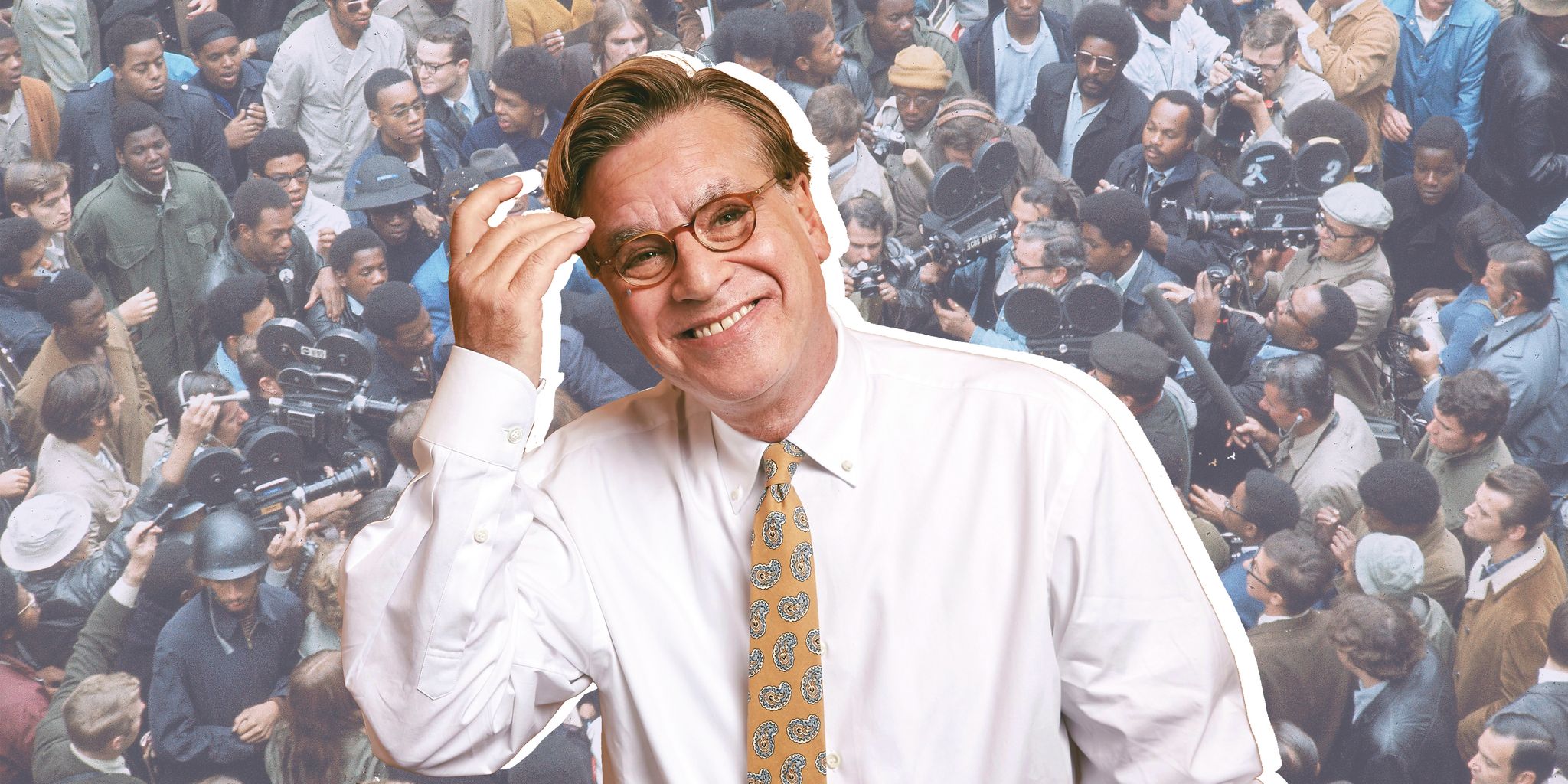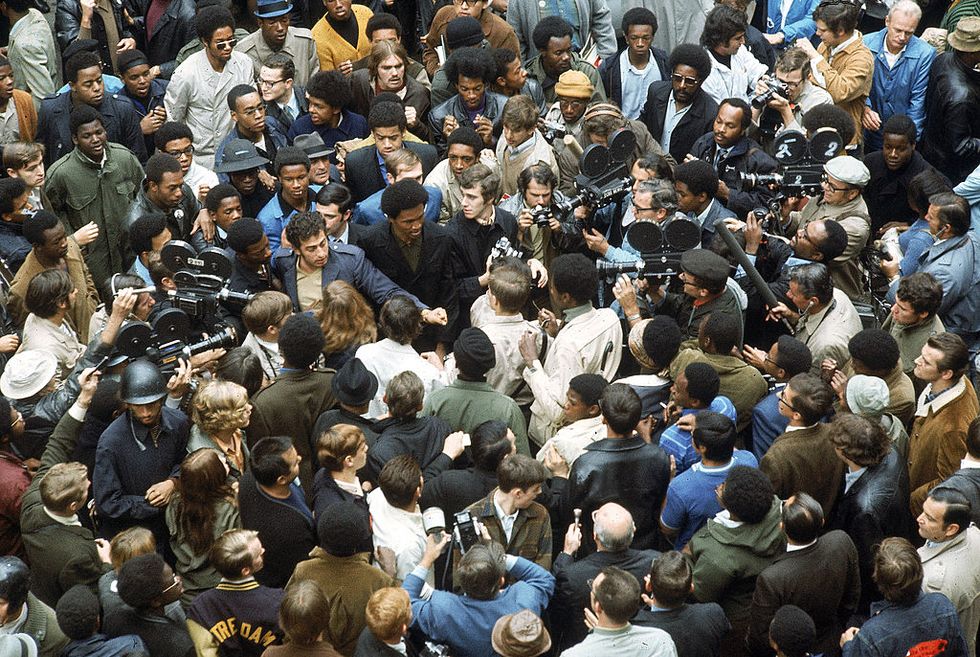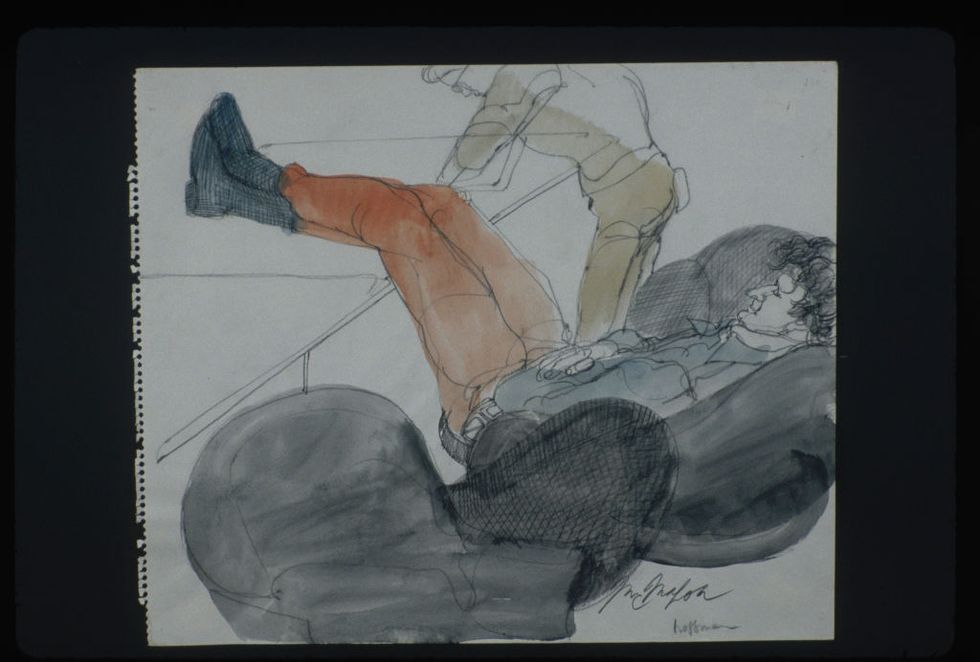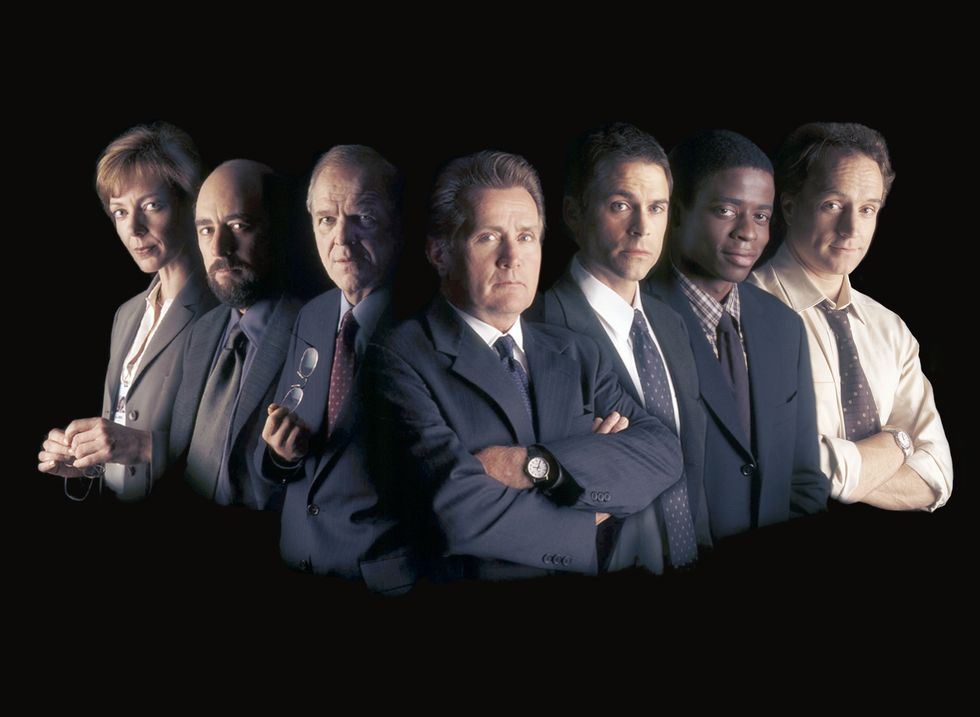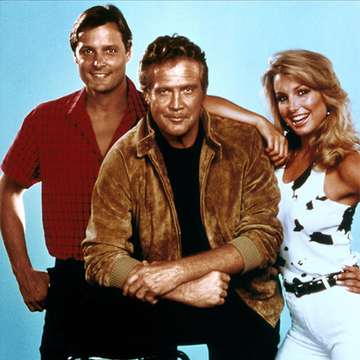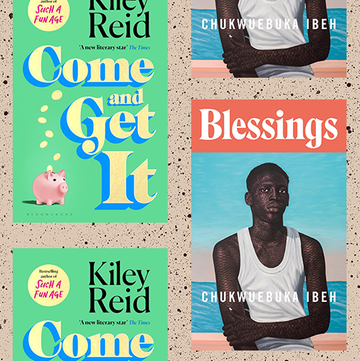Furious protesters facing off against baton-wielding police. A nation riven by anger. A high-stakes, bitterly fought presidential contest.
It sounds like America in 2020, but we’ve been here before, specifically in Chicago 1968—a world recreated by director and screenwriter Aaron Sorkin in his new film, The Trial of the Chicago 7 (which debuts 16 October on Netflix). It’s based on the chaotic trial of seven defendants—including hippie icon Abbie Hoffman (played by Sacha Baron Cohen) and political activist Tom Hayden (Eddie Redmayne)—charged with conspiracy to incite the riots that erupted at the Democratic National Convention. The trial was like nothing the country had ever seen: One defendant, Black Panther leader Bobby Seale, was ordered bound, gagged, and chained to a chair; Hoffman once arrived in court wearing judicial robes, blew kisses to the jury, and regularly insulted Judge Julius Hoffman (played by Frank Langella).
With a resume that includes A Few Good Men, The American President, Bulworth, The Social Network—and, of course, the television series The West Wing—Sorkin is not shy about talking politics. And so, with the nation poised to vote in one of the most dramatic and consequential presidential elections in decades, we caught up with Sorkin to see what he makes of our current moment.
Esquire: Why the Chicago 7? What drew you to this story?
Back in, I think it was 2006, I was asked to come to Steven Spielberg’s house on a Saturday morning. He told me that he really wanted to make a movie about the Chicago riots and the crazy conspiracy trial that followed. And I pretended I knew what he was talking about. I said, “Oh, that sounds great. Yes. We should do that. I want to write that movie.” As soon as I left his house and got in my car, I called my father and said, “Dad, could you tell me about the riots in Chicago and the crazy conspiracy trial that followed?” I had a vague sense that there had been unrest at the Democratic Convention in 1968; I had a vague sense that Abbie Hoffman was a member of the counterculture; and I think all I knew about Tom Hayden was that he had been married to Jane Fonda at some point.
After you got off the phone with your father and started digging in, how did you react?
This was one of the craziest trials in American history. It lasted six months and the judge was nuts and the defendants were very colourful and so were a lot of the witnesses. But to be honest, I had a hard time identifying with the defendants. My feeling was that Abbie Hoffman, Jerry Rubin, and their ilk may have done more harm to a cause we should all get behind. And I found out that Hayden felt the same way about Abbie, and this friction is dramatised in the film.
What was their issue?
The fear was that for generations, when people thought of progressives, they were going to think of these drugged out, dropped out, anti-social, anti-institutional, ridiculous hippies who were passing out daisies to soldiers and trying to levitate the Pentagon.
Did you end up warming up to Abbie Hoffman?
I have a hunch I wouldn’t be able to be around Abbie Hoffman for 24 hours without losing my mind, but I think that a lot of people felt that way. But as I learned more, there were three things that I was interested in writing about. The courtroom drama. The evolution of the riot—how did what was supposed to be a peaceful demonstration devolve into this terrible riot as Hubert Humphrey was being nominated just feet away on Michigan Avenue? And the third story, the more personal story of the friction between Abbie and Tom and how they came to respect each other.
One thing that strikes me about Hoffman is that he was a genius at creating a spectacle and manipulating the media, of controlling the narrative and getting his message out.
That’s exactly what Abbie tries to make Tom understand—that we have to do these outlandish things because we don’t have any money; that when we try to levitate the Pentagon, that’s when the cameras come.
Another thing is that Abbie Hoffman and Donald Trump might have enjoyed comparing notes.
You’re talking about the ability to get attention?
Yes. In provocative and sometimes outlandish ways.
Is getting attention really that hard to do?
Getting attention, controlling the news cycle, redirecting the conversation. I think there’s an art to that.
OK, I agree with that. I just cringe a little bit when it’s suggested that Donald Trump is any kind of mastermind, that there’s any degree of three-dimensional chess instead of just a guy who’s eating chess pieces.
The timing of the film seems almost too perfect.
I would prefer it to feel less relevant. While we were making it, I was struck by a photograph from 1968—we wound up recreating it in our first shot of the crowd outside the courthouse. Some of the signs that were being held up: “America: Love It or Leave It.” “Lock Them Up.” You’ve been hearing that a lot in the last three years. And then the police out in the street gassing and beating protesters right in front of the White House. I was hearing people say things that were barely paraphrased lines from the movie. I mean, they were almost word for word. I couldn’t believe it. Trump even tweeted that crossing state lines to incite violence was a federal crime. He didn’t add that there was only one time in American history that someone was charged with that crime.
The Chicago 7. It’s definitely eerie. What do you make of that? Has America been running in place since 1968?
There are people who are in a much better position to answer that question than I am. I do think that there are people, some of them friends of mine, who if I said, “I thought we had come so far,” would probably say, “I know you thought that.”
I’m curious about your thoughts about the presidency. In The West Wing you created a president, Jed Bartlett, who was embraced and adored by much of the country.
I think that what people liked about The West Wing, what they liked about all of those characters, including Bartlett, is that they all seemed to wake up in the morning and come to work wanting to do good. They were fundamentally good people. The show was a Valentine to public service and to American institutions, and people responded to that. Ordinarily in popular culture, our elected leaders are portrayed either as Machiavellians or dolts. And here was a workplace drama where the president and his staff were as competent as the doctors and nurses are in a hospital show or the detectives are in a detective show.
A Republican might see things differently. Or at the very least dismiss it as a kind of liberal fantasy.
At the end of the Chicago 7 I throw some things up on the screen. I tell the audience that the judge in the trial, Julius Hoffman, was given an “unqualified” rating by 87 percent of Chicago trial lawyers. A few months ago, a judge who was nominated by the Trump administration, and then confirmed by the Senate—he had never sat on any bench, never argued any cases in court, never deposed a witness. It’s a lifetime appointment to a federal bench for someone who was given a 100 percent rating of “unqualified” by the American Bar Association. If I’m a Republican, that’s not the judge I want on the federal bench. I want the judge to be a good judge, just like I do when a Democratic president nominates a judge.
Are you optimistic about the future?
If it wasn’t for this election, I wouldn’t be able to get up in the morning.
There’s no President Trump without Twitter. How do you feel about social media?
I have an opinion about that.
I am not surprised. Let’s hear it.
Online bullying is incredibly terrible and destructive. When we were little kids on the playground, and you said something mean to another kid—because you were 6 years old and you wanted to see what it felt like being mean—you could immediately see on the kid’s face what you just did to him. And that, right there, is when you learned empathy. It doesn’t stop us from shouting things from our car at other drivers, from the safety of this steel thing that’s going 65 miles an hour. The Internet gives you that safety. I think that nothing has made us nationally dumber and meaner than the anonymity of the Internet. And we finally got what we deserved: A Breitbart commenter in the Oval Office.
Was that inevitable?
In my wildest dreams, I never imagined that it would happen. But there was a kind of confluence, a perfect storm of dark forces, and I’m not talking about the Russians, although there was that. We are told about Trump’s ability to relate to the economic anxiety of the middle class. I’ve never in my life heard him mention the economic anxiety of the forgotten middle class. I only ever hear him talk about himself or his enemies. What Trump was for the forgotten middle class was a stick with which to poke liberals in the eye. And every time he makes me crazy, they love it.
They’re going to love this interview.
I have a hunch I shouldn’t talk like this.
Your projects are best known for witty and intelligent people speaking to one another at length in witty and intelligent ways. But the centrepiece of The Trial of the Chicago 7 is a massive, chaotic, violent riot. What was it like working at that kind of scale?
There’s a scene in my first movie, A Few Good Men, where Tom Cruise is driving his car in Washington, D.C., pulls over to a newsstand, hops out, gets a copy of Sports Illustrated, hops back in the car, and drives away. Until Chicago 7 that was my only action scene. I like compressing time and space. When you bring home a new puppy, they say that you should get a crate that is just big enough for it to be able to turn around in. It gives them a feeling of security; if they have too much space, they get scared. When I’m writing, I’m like that. That’s why I like courtroom films. It’s all laid out for you and you don’t have to go outside. During the riot scenes in Grant Park, not only were we outside, there were no walls. It was terrifying—thank God it was at least a rectangular park.
Did the experience make you want to try your hand at a bona fide action flick? I’m trying to imagine Aaron Sorkin doing a Marvel movie.
I have a hunch it would be a little more chatty than the Marvel movies we are used to. I think that the people who direct those big action movies have a skill set I don’t have.
It seems like in this presidential election, the stakes are higher and the drama is pitched in ways we haven’t seen since, probably, 1968. What if Aaron Sorkin was writing about this moment?
There will be a lot of writing about this moment, about the last four years, by playwrights, screenwriters, novelists, television writers. And I’m willing to bet you a dollar right now that in none of them will Trump be an onscreen character. You will never see an actor playing Donald Trump. He will always be shown playing himself in news footage. And the reason why is that he is simply not plausible. Any attempt to recreate Donald Trump will look exactly like Alec Baldwin on SNL. You can write about good guys and you can write about bad guys. You can write about protagonists and antagonists. You can write about antiheroes. But you can’t write about a character who doesn’t have a conscience.
